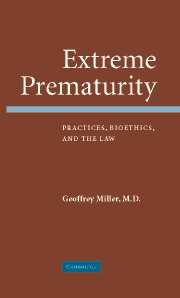Book contents
- Frontmatter
- Contents
- Part 1 THE EXTREMELY PRETERM INFANT: EPIDEMIOLOGY, PERCEPTIONS, AND PRACTICES
- Part 2 BIOETHICS
- 14 Moral Theory
- 15 Autonomy
- 16 Beneficence and Nonmaleficence
- 17 Justice
- 18 Sanctity of Life
- 19 Active and Passive Euthanasia
- 20 Personhood
- 21 Quality of Life and Best Interests
- 22 Futility
- Part 3 REPORTS, OFFICIAL OPINIONS, AND GUIDELINES
- Part 4 THE LAW
- Part 5 EPILOGUE: TRUTH, TRUST, AND BOUNDARIES
- References
- Index
20 - Personhood
Published online by Cambridge University Press: 23 September 2009
- Frontmatter
- Contents
- Part 1 THE EXTREMELY PRETERM INFANT: EPIDEMIOLOGY, PERCEPTIONS, AND PRACTICES
- Part 2 BIOETHICS
- 14 Moral Theory
- 15 Autonomy
- 16 Beneficence and Nonmaleficence
- 17 Justice
- 18 Sanctity of Life
- 19 Active and Passive Euthanasia
- 20 Personhood
- 21 Quality of Life and Best Interests
- 22 Futility
- Part 3 REPORTS, OFFICIAL OPINIONS, AND GUIDELINES
- Part 4 THE LAW
- Part 5 EPILOGUE: TRUTH, TRUST, AND BOUNDARIES
- References
- Index
Summary
According to Englehardt,(208) it is morally acceptable to allow a severely disabled infant to die when it is unlikely that the infant can attain a developed personal life, that is, become a person, and when it seems clear that providing continued care would constitute a severe burden for the family. He argued that there is “an injury of continued existence”(208) and that a child has a right not to have his or her life prolonged in those cases where life would be “painful and futile.”(208) He does not define futile. He proposed that allowing a severely disabled infant to die is not only morally acceptable but also morally demanded. Although Englehardt used the principles of nonmaleficence – beneficence and justice and preventing a continuing injury – removing a burden from the family and the right not to have a painful futile life, as well as suggested that there might be a universal law that demands that a severely disabled infant be allowed to die, he also stated that the attainment of personhood is important to the argument. Singer defined a person as an individual who has rationality and selfawareness.(209) He asked if the life of a being that is conscious, but not self-conscious, has moral value, and if so, how the value of such a life compares with the life of a person. Singer believed infants are beings that are neither rational nor self-conscious.
- Type
- Chapter
- Information
- Extreme PrematurityPractices, Bioethics and the Law, pp. 74 - 79Publisher: Cambridge University PressPrint publication year: 2006



